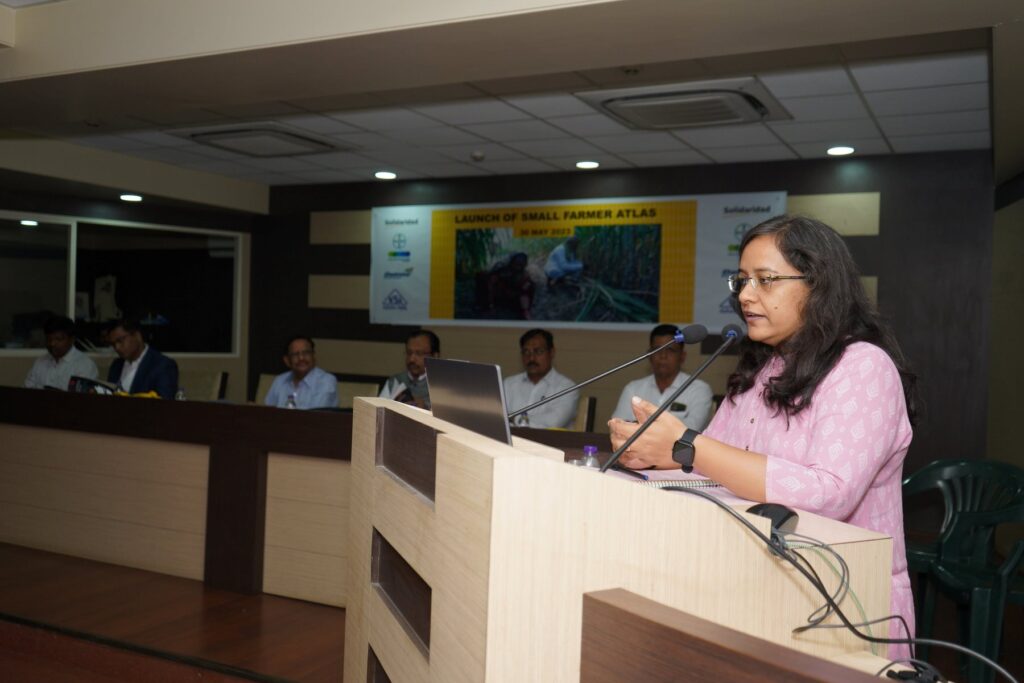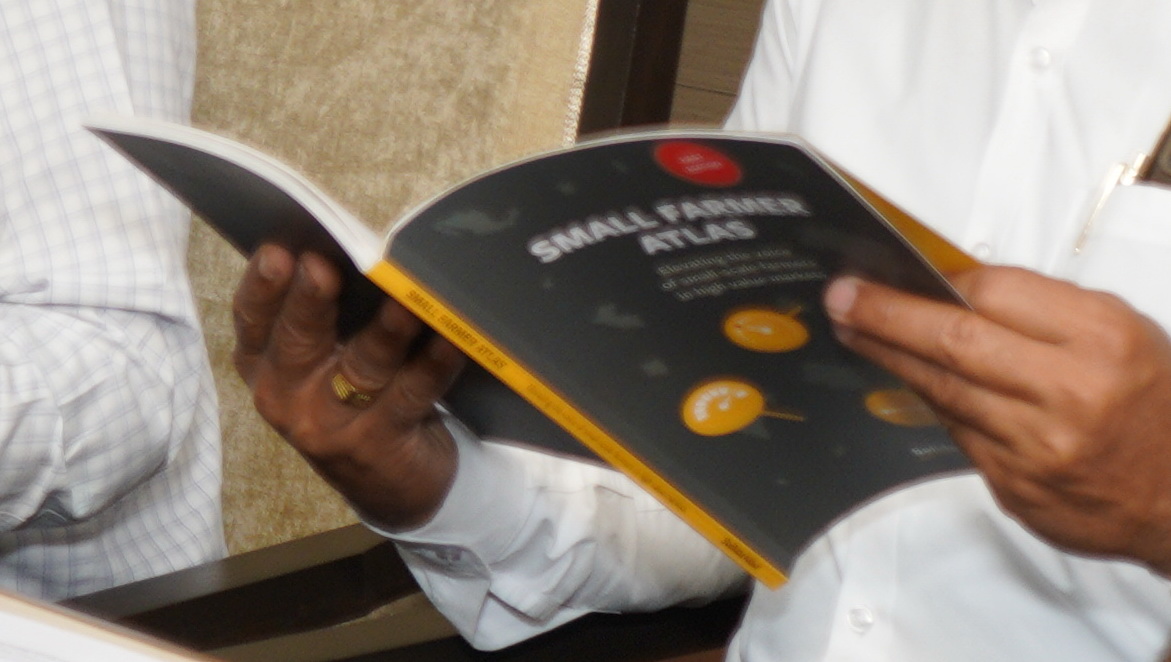The Small Farmer Atlas reveals high income dissatisfaction, yet changing climate remains farmers’ biggest concern
Small-scale farms account for 90 per cent of the world’s 570 million farms, yet these farmers are often sidelined in discussions on topics critical to their livelihoods. The Small Farmer Atlas, a comprehensive satisfaction survey covering nearly 10,000 farmers in 18 countries on three continents, is an effort to help companies, governments and civil society to learn from farmers’ perspectives on sustainability.

The Small Farmer Atlas was launched by Shambhaji Kadupatil – Director General, VSI; Monika Khanna, Country Manager, Solidaridad Regional Expertise Centre; Mahesh Kharade Lead Farmer – Maharashtra; Dr. Santosh Karanje, Subject Expert – KVK; Ganesh Salunkhe, Regional Manager – Bayer; Santosh Kumbha, Managing Director – Dalmia Bharat Sugars; Pankaj Gawande; Head Quality Control and Sustainability – Baramati Agro); at the Vasantdada Sugar Institute, Pune, Maharashtra, on 30 May 2023. The event was attended by more than 50 sugarcane small farmers from Maharashtra.
“Farming is the most important job in the world. They are the original influencers shaping our daily diets. The opinions and views of farmers matter,” says Jeroen Douglas, Executive Director Solidaridad Network. “We invite companies and governments to take this to the next level and work to truly involve farmers in the design of policies and sourcing practices.”
The Atlas includes farmers’ insights on issues ranging from prosperity and income, to bargaining power, land use and environmental sustainability. This data-rich resource covers eight commodities: bananas, cocoa, coffee, cotton, palm oil, soybeans, sugarcane, and tea.
Key findings include:
●For most farmers, their income is insufficient for weathering climate shocks and price volatility.
●Over half of all farmers surveyed feel they lack adequate access to markets, financing and information to succeed.
●Climate change issues – soil quality, ability to adapt to climate change, and access to water – are farmers’ biggest concern.
Find more at www.smallfarmeratlas.info
WHO ARE SMALL-SCALE FARMERS? THE ANSWER DEFIES EASY DEFINITION
Small-scale farmers are not a contiguous, easily-defined group. The eight commodities covered in the Atlas are produced by roughly 120 million small-scale farmers, the majority of them in Africa, Asia and Latin America. For this report, Solidaridad focused on two distinct categories of small-scale farmers:
●Small-commercial – These farmers typically sell a high portion of their production into commodity value chains, yet often live with poverty and rely on diverse strategies to survive.
●Semi-commercial – These are farmers with land holdings of less than 20 hectares. They are well-connected to domestic and international value chains, and farming can be a viable livelihood strategy for eventually achieving a living income.
Some of these farmers still live below the poverty line, others are on their way to a living income, yet these farmers have the means and access necessary to make farming work. Even for this potential, the research found that most have a negative outlook for the future of farming.
“Small farmers’ produce feeds nearly 8 billion people globally. Despite their massive contribution to food value systems, majority live in poverty. The Small Farmer Atlas highlights that compared to the incremental increase in farmer income, the cost of farm input has gone up exponentially over the last few years, thus reducing the overall savings for the farmer,” says Shatadru Chattopadhyay, Managing Director, Solidaridad Asia.
“While spotlighting the challenges faced by small farmers in India and 17 other countries, the Atlas aims to steer policy conversations around solutions that can make small farmers resilient to climate change impact, provide them better market access and reward them for sustainable practices,” he adds.
THE LOOMING IMPACTS OF CLIMATE CHANGE
For many farmers, the impacts of a changing climate are their biggest concern. Nearly two thirds of farmers surveyed struggle with a lack of resources needed to adapt to the impacts of climate change. Furthermore, across all 18 countries covered, farmers express grave concerns about deteriorating soil quality and water scarcity.
●60 per cent expressed serious concern about the quality of their soils and the capacity to improve soil health.
●60 per cent expressed dissatisfaction with the availability of water for irrigation.
●57 per cent do not have the resources to adapt to climate change.
SIGNS OF PROGRESS, OPPORTUNITIES TO IMPROVE
Over half of the farmers interviewed express confidence in their ability to meet basic needs. This indicates that sustainability interventions have had a positive impact, even through the pandemic and the related economic downturn when the survey was conducted.
And yet the majority of farmers express that they are ill-equipped to handle price volatility or climate shocks. Women, in particular, are concerned with their ability to achieve a fair income, to find market support, and produce in harmony with the natural environment.
Overall, the Small Farmer Atlas illustrates the need for two key interventions:
●Profit-sharing across agricultural value chains that directly benefit farmers, and improve their business case so they can invest in their farms and access finance.
●The need for systemic change that prioritizes the perceptions of small-scale farmers and grounds interventions in their needs.

“In India, agriculture, and its allied sectors, is the largest source of livelihoods. 70 percent of India’s rural households still depend primarily on agriculture for their livelihood, with 85 percent of farmers being small and marginal. These farmers have less than 2 hectares of land, with 70 percent having less than 1 hectare of land. Given that smallholders represent a very large number of individuals with diversity of situations, their individual voices are hardly heard. Smallholders are the foundations of our food system, so it makes sense that their voices are heard for an inclusive agricultural transformation. As a novel attempt, Solidaridad explores the experiences and expectations of small-scale farmers in 8 global value chains.”, says Monika Khanna, Country Manager, Solidaridad India.



